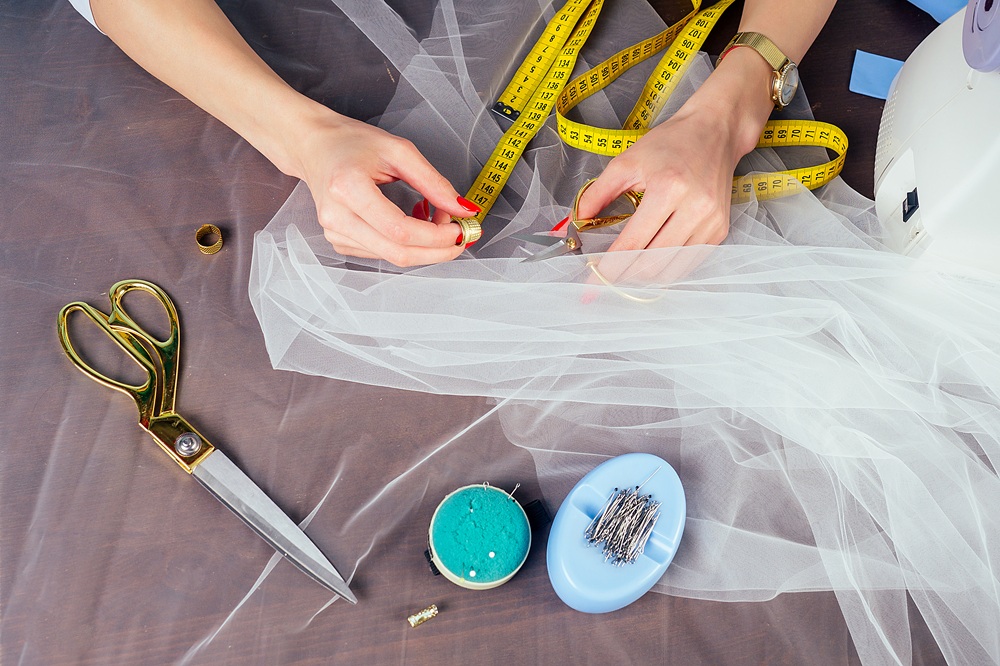Do you know the first thing most people do in the event of a wardrobe malfunction? They grab the nearest safety pin or a random piece of tape, hoping to patch things up in a pinch. But if you ever tried a quick fix only to have the same problem resurface, you know temporary solutions only go so far.
If you ever thought about hemming your own jeans, tightening a loose waistband, or fixing a popped seam, be sure to get a good set of beginner-friendly tools first. A solid beginner’s kit doesn’t have to be complicated or expensive. So, what exactly should you have on hand?
Check out these must-have sewing tools every beginner needs for hassle-free clothing alterations.
1. Sewing Machine (For Speed and Precision)
A sewing machine is the backbone of any serious clothing alteration setup. While you can do some small fixes by hand, a good sewing machine speeds up the process, creates stronger stitches, and gives your alterations a professional finish.
What to Look for in a Beginner Sewing Machine
- Straight Stitch and Zigzag Stitch: These two are the foundation of most alterations.
- Adjustable Stitch Length and Width: Helps you customize stitches based on the fabric type.
- Free Arm Feature: Makes hemming sleeves, cuffs, and pant legs easier.
- Automatic Buttonhole Function: Saves you from struggling with manual buttonholes.
Popular beginner-friendly sewing machines include models from Singer, Brother, and Janome. If you’re altering heavier fabrics like denim or leather, consider a heavy-duty sewing machine that can handle thick materials.
2. Hand Sewing Essentials
Even with a sewing machine, hand sewing skills are crucial for delicate fixes, finishing touches, and garments that need extra care. Here’s what you need in your hand sewing kit:
- Sewing Needles: Get a variety pack. Fine needles work for delicate fabrics like linen or silk, while heavier-duty needles are best for denim and coats.
- Thread: A high quality cotton or polyester thread ensures durability. Keep basic colors like black, white, navy, and beige on hand.
- Thimble: Saves your fingers from getting pricked when hand stitching thick materials like denim or leather.
Hand sewing is especially useful for hemming, sewing on buttons, and reinforcing weak seams. Even if you machine sew, you still need these essentials for finishing details.
3. Measuring and Marking Tools (For Accuracy)

One of the biggest mistakes beginners make? Not measuring properly before making an alteration. Guesswork leads to uneven hems, crooked seams, and ill-fitting adjustments. To avoid this, use the following tools:
- Measuring Tape: Essential for taking body measurements and marking alterations. A soft, flexible tape is best for clothing.
- Fabric Chalk or Marking Pen: These help you mark lines where you need to cut, sew, or adjust without damaging the fabric.
- Ruler and French Curve: Rulers help measure straight edges, while a French curve is great for shaping necklines, armholes, and waist adjustments.
When altering anything from waistbands to shoulders, accuracy is everything. Always measure twice before cutting or sewing.
4. Cutting Tools (For Precision)
Cutting fabric incorrectly can ruin your garment. Make sure you have the right tools for clean, precise cuts:
- Fabric Scissors: Never use regular household scissors for fabric! Get a sharp pair designed specifically for cutting textiles.
- Rotary Cutter and Cutting Mat: Great for cutting long, straight seams and working with multiple fabric layers.
- Seam Ripper: If you make a mistake (don’t worry, it happens to everyone), a seam ripper lets you undo stitches cleanly without damaging the fabric.
Investing in good quality cutting tools saves you time and frustration—and helps you avoid jagged or fraying fabric edges.
5. Pressing and Finishing Tools (For a Professional Look)
Pressing is one of the most underrated steps in alterations. A well-pressed seam or hem gives your work a clean, polished finish. Here’s what you need:
- Iron and Ironing Board: Pressing seams open reduces bulk and makes your stitches look crisp.
- Pressing Ham: A tailor’s secret weapon! This tool is perfect for pressing curved areas like darts, shoulders, and sleeve caps.
- Steam Iron or Garment Steamer: A must for materials like linen, wool, or silk, where a crisp press makes all the difference.
Never underestimate the power of pressing—it’s what makes your alterations look store bought instead of DIY.
6. Fasteners and Closures (For Fixing and Adjustments)
One of the most common alterations is replacing or adjusting fasteners. Here’s what to keep in your kit:
- Buttons: Have extras in different sizes for shirts, blazers, and coats.
- Zippers: Stock up on common zipper sizes for pants, jackets, and dresses.
- Hook and Eye Closures: Perfect for fastening waistbands, collars, and formalwear.
Fasteners are tiny but essential—a missing button or broken zipper can ruin a garment, but having the right supplies makes for an easy fix.
7. Tailoring and Adjustment Tools
Once you’re comfortable with basic alterations, you’ll want tools that help with more advanced tailoring. Consider adding these to your toolkit:
- Dress Form (optional, but helpful): If you do a lot of tailoring, a dress form lets you pin and adjust garments more accurately.
- Tailor’s Chalk: Makes temporary markings on fabric for alterations. It’s easy to remove once your sewing is done.
- Bodkin: A handy tool for threading elastic or drawstrings through waistbands.
These tools make more complex alterations like dart adjustments, waistband tightening, and silhouette shaping much easier.
8. Sewing Storage and Organization
Keeping your sewing tools organized helps you work faster and avoid losing important pieces. Here’s how to stay tidy:
- Sewing Kit or Toolbox: Keeps your essential tools in one place for easy access.
- Thread Rack: Helps you see your threads at a glance and prevents tangling.
- Magnetic Pin Holder: Makes grabbing pins quick and easy while working.
An organized workspace means fewer distractions and a smoother sewing process—no more hunting for that missing spool of thread!
Don’t Have These Tools? Let Widmer’s Cleaners Handle Your Alterations!
Tools for beginner clothing alterations are a great investment, but trusting Widmer’s Cleaners’ expert Alteration Service is an even smarter choice. We save you time and effort by delivering precise, high quality tailoring at a reasonable price. Our skilled tailors and seamstresses cater to all types of clothing adjustments, from simple fixes like hemming and button replacements to more complex alterations such as resizing suits, tapering dresses, and repairing delicate fabrics.
Visit our website at widmerscleaners.com to find the store closest to you and let our professionals do the work for you! You may also call us at 513-506-0097 for further inquiries.


